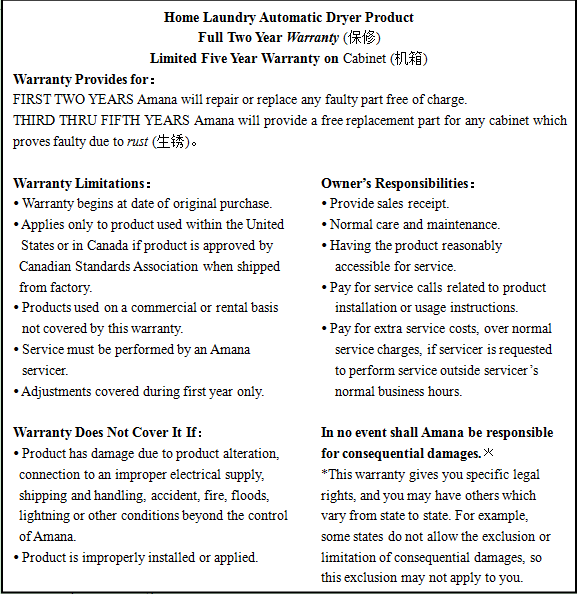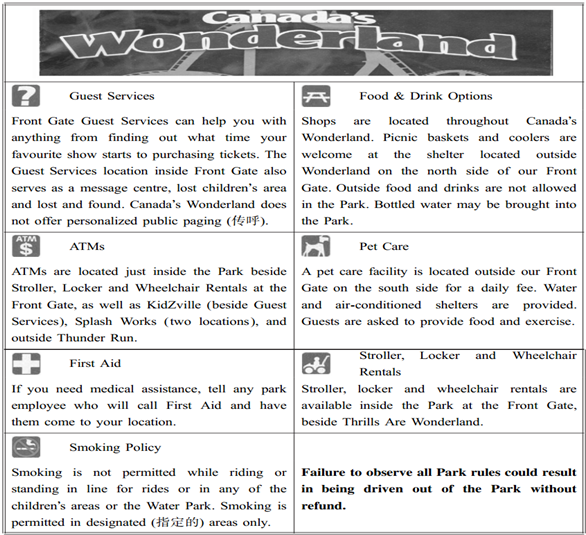题目内容
1.
69.According to Warranty Limitations,a product can be under warranty ifD.
A.shipped from a Canadian factoryB.rented for home use
C.repaired by the user himselfD.used in the U.S.A.
70.According to Owner's Responsibilities,an owner has to pay forB.
A.the loss of the sales receiptB.a servicer's overtime work
C.the product installationD.a mechanic's transportation
71.Which of the following is true according to the warranty?C
A.Consequential damages are excluded across America.
B.A product damaged in a natural disaster is covered by the warranty.
C.A faulty cabinet due to rust can be replaced free in the second year.
D.Free repair is available for a product used improperly in the first year.
分析 本文是一份产品的保修单.一篇烘干机的保修情况说明,文中详细地说明了这款家用自动洗衣烘干机的保修范围、保修期限等.
解答 69.D 细节理解题. 根据"Warranty Limitations"保修限制部分的"Applies only to product used within the United States or in Canada"适用于在美国或者加拿大使用的产品,可知D项正确.根据"if product is approved by Canadian Standards Association when shipped from factory."适用于产品从工厂运输时由加拿大标准协会批准的产品,并不是说一定要从加拿大的工厂运出来.因此A项错误.根据"Products used on a rental basis not covered by this warranty"租用的产品是不覆盖在保修范围的,因此排除B项.根据"Service must be performed by an Amana service"服务必须是在Amana的维修工来操作的,从而排除C项,故选D.
70.B 细节理解题.根据从该部分的最后两条里面找.需要付钱的项目里面没有A项,因此排除.根据"Pay for extra service costs,over normal service charges,if service is requested to perform service outside service's normal business hours"可知,需要付额外的服务费用,比通常的服务费用要高,如果维修人员在正常工作时间之外被要求服务的话.因此B项是正确的,即维修人员的超时服务.根据"Pay for service calls related to product installation"可知,你需要支付的是叫安装服务的电话费用calls,而不是安装费用,故排除C项.D项也没有在文中提到,从而排除,故选B.
71.C 细节理解题.根据最后一段的"This warranty gives you specific legal rights,and you may have others which vary from state to state"意为这个保修给予了你具体的合法权利,同时你也可能有其他的一些权利,这在不同的州情况有所不同,因此排除A项.根据"Product has damage due to…floods"可知,由于自然灾害,比如洪水,造成的损失,是不属于保修的,因此排除B项.根据"Product is improperly installed or applied"意为不恰当的安装和使用造成的损失是不保修的.因此排除D项.
点评 解答细节理解题时,一个常用的方法就是运用定位法,即根据题干和选项中的关键词从原文中找到相关的句子,与选项进行比较从而确定答案;推理判断题既要求学生透过文章表面文字信息推测文章隐含意思,又要求学生对作者的态度、意图及文章细节的发展作正确的推理判断,力求从作者的角度去考虑,不要固守自己的看法或观点.

 一诺书业暑假作业快乐假期云南美术出版社系列答案
一诺书业暑假作业快乐假期云南美术出版社系列答案| A. | will see | B. | sees | C. | saw | D. | has seen |
| A. | anyone | B. | anyone else | C. | no one | D. | no one else |
| A. | have; have | B. | has; have | C. | have; has | D. | has; has |
